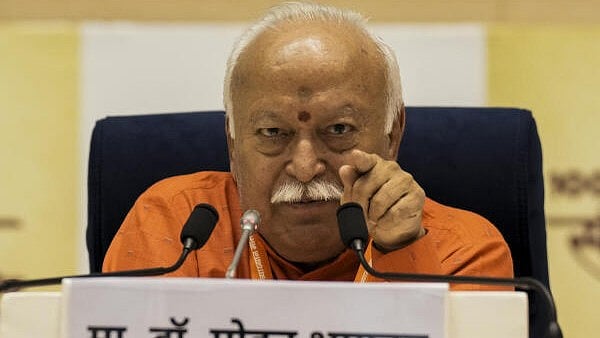
Rashtriya Swayamsevak Sangh (RSS) chief Mohan Bhagwat
Credit: PTI Photo
Patna: The Rashtriya Swayamsewak Sangh (RSS) — the ideological mentor of the BJP, the dominant force in the country — is aiming to go global from local as part of its ambitious centenary year plan, even as it grapples with challenges within, like the expansion of its affiliate forums that are loosely yet inseparable from the parent organisation.
In the three-party lecture series by Mohan Bhagwat in Delhi last week, the RSS chief underscored the intrinsic aspects of the sangh modus and its ideology moorings for "character-building" in its shakhas to bring about a transformation in the society in India, which, according to the RSS, is a "Hindu Rashtra" (Hindu nation).
Towards that end, Bhagwat exhorted his cadre to relentlessly reach out to every village and every household in the country. Quoting former RSS chief Rajju Bhaiyya, Bhagwat said the time had come for the RSS to address the world at large.
“If I had called you earlier and said all this, you wouldn’t have heeded much. But today, things have changed. Society at large listens to us. They may or may not agree with us, but we are seen as a credible organisation”, Bhagwat told over a thousand invitees, including representatives from over 40 missions.
The first overseas RSS shakha was organised by Indian expats in Kenya in 1948. Since then, the Sangh — through the Hindu Swayamsewak Sangh — has sought to expand its footprint abroad.
Expanding overseas
The thrust on overseas expansion could be due to multiple factors, including a conducive situation back home, with its political affiliate holding power at the Centre for over a decade now. The growing numbers and influence of the Indian diaspora abroad also provide perfect landing and launching pads to experiment beyond the frontiers.
And finally, in the globalised polity, it is difficult for a large organisation like the RSS to completely insulate itself from other nations' socio-economic and political developments. Owing to its ideological links to the BJP, it can hardly evade international scrutiny.
For instance, the Bajrang Dal's alleged role in the recent arrest of Catholic nuns in Chhattisgarh’s Durg has come up in the US. The US State Department's reports on religious freedom, citing media and NGOs, have mentioned incidents of communal violence triggered by religious processions led by affiliated “Hindu nationalist groups”. Managing international perception, thus, is critically important for the Sangh.
Domestically, the lure of power and the consequential lateral entries as the affiliates expand their base pose no less a challenge, especially for an organisation with centralised functioning.
Bhagwat, in the Delhi interaction, candidly admitted internal differences of opinion. The credit for the “good work the people do is entirely theirs”, he said, though the RSS did have to share the discredit when things went awry. In this context, the most complex and convoluted was the RSS’ relationship with the BJP.
The RSS influence
The BJP’s ascension helped the RSS on two fronts. The Modi government has sought to deliver on key ideological issues of its mentor, like the Ram Temple, abrogation of Article 370, and the Uniform Civil Code (UCC) in some states. In return, the Sangh has given operational freedom to the BJP to run the country.
This is something even Bhagwat hinted at when he said the BJP knew how to run the country, but "we" (the RSS) knew how to run shakhas. “We don’t decide for them,” Bhgwat said.
The real message was, however, in the disclaimer he delivered after a pregnant pause: “We don’t decide. Otherwise, wouldn’t we have decided by now?” He was alluding to the stalemate over the appointment of the new BJP president after J P Nadda’s term ended last year.
BJP patriarch L K Advani, in the 2005 national executive meeting in Chennai, triggered a debate on the RSS-BJP ties when he said: “Lately, an impression has gained ground that no political or organisational decision can be taken without the consent of the RSS functionaries. This perception, we hold, will do no good either to the party or to the RSS.”
Even Nadda broached the subject in an interview in the run-up to the 2024 Lok Sabha polls.
In the past, the RSS stepped in with determined agility, whenever required, to settle internal and inter-organisational differences. In 2017, at the national executive of the Vishwa Hindu Parishad, former VHP chief Pravin Togadia backed a candidate who outvoted the RSS nominee in the presence of the then RSS general secretary Suresh "Bhaiya Ji" Joshi.
The elections were, however, postponed, and the Sangh finally got a person of its choice to head the VHP.
But these are different times. As the RSS grows, some of its associate organisations may also have outgrown the relationship that bound them to the mothership.